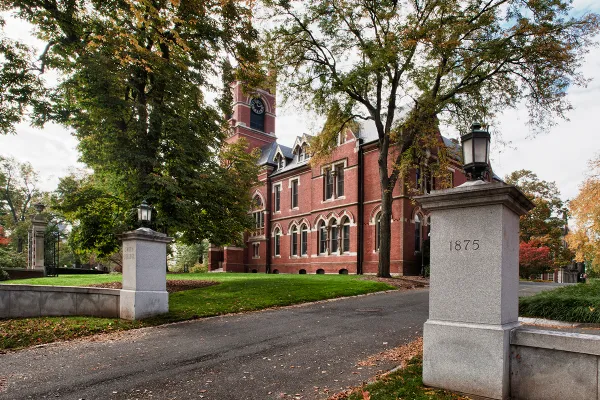Educating Students to Live with Change: An Interview with Provost Katherine Rowe
News of Note

Published October 24, 2014
In Katherine Rowe’s view, this is the perfect time to be a humanities scholar.
That’s because liberal arts institutions that integrate traditional and new modes of thinking are uniquely positioned to prepare students for the future, says Rowe, who began work at Smith in July as provost, dean of the faculty and Sophia Smith Professor of English Language and Literature.
“Our mission is to encourage students to move between modes of learning,” noted Rowe, who is a scholar of Renaissance literature and media history. Rowe’s experience leading digital humanities initiatives as a 16-year faculty member at Bryn Mawr College and her scholarship and teaching on the topic led The New York Times to count her among “a small vanguard of digitally adept scholars” who are rethinking liberal arts education.
Rowe will share some of those insights on Monday, Oct. 27, in the first in a series of chaired lectures at Smith. Her talk, “A Walking Guide to Virtual Shakespeare,” will explore how traditional modes of humanities knowledge are migrating into new media. It will be held at 4:30 p.m. in Seelye Hall 106.
In addition to being a scholar and teacher, Rowe is also an Ultimate Frisbee player who counts three Smith alumnae among her extended family. Here’s what Rowe had to say about initiatives she is leading at Smith:
What drew you to Smith?
Rowe: “I am deeply committed to women’s education. In 16 years at Bryn Mawr, I came to understand what an exceptional population seeks out women’s colleges. These are students who know themselves and are capable of making an unusual choice. They are extraordinary to teach. As I’ve been getting to know Smith, I’ve learned how deeply intertwined learning and research are here—the way faculty bring students into advanced research in many fields. I’m attracted by the cross pollination between the sciences and humanities and the arts that is particularly lively here. I’ve learned from students I know here what a deeply intellectual and accepting place Smith is. I’m also an Ultimate Frisbee player, so coming to this part of the country, which is a hotbed of Ultimate, was coming home to my tribe.”
What initiatives will you be working on in the near future?
Rowe: “I am particularly interested in the library renovation project. We need to be thinking about how we design a library that provides flexibility for the future and continuity in our longstanding ways of knowing. A student I met a few weeks ago at Sarah Thomas ’70’s alumnae talk on the future of libraries pointed out that her peers use the library in many different ways. She asked, ‘How do we design a library for such diverse uses, knowing that they will keep changing?’ That’s the key question, but innovation and continuity do not have to be opposed to each other as we find Smith’s particular answer. Faculty Council, the library staff and I will be sponsoring speakers over the next six months and hosting a field trip to Williams College’s new library to spark our collective thinking about this question. This spring, the Library Programming Committee will begin meeting with an architect and seeking to understand how students use the library now and how faculty use it for research.”
You are also chairing a new Working Group on Campus Discourse. Can you talk a bit about that effort?
Rowe: “I am learning how important it is at Smith to be able to disagree in a way that’s passionate and informed and acknowledges all voices. The Working Group on Campus Discourse will be gathering ideas from faculty, staff, students and alumnae about how we have conversations about difficult topics and hosting programming for the year. This is a lifelong learning effort for all of us and one we view as a core mission at Smith. The working group will be coordinating with other campus groups such as the Student Government Association. They have been terrific partners for me this fall in planning this work.”
What do you see as the biggest educational challenge facing the college?
Rowe: “We are educating students for lives as citizens and professionals in a world where the modes of communication are rapidly changing. It’s a world where they will have an unprecedented choice of ways to communicate, and they need to choose critically and wisely. Their professional communities will be multilingual, from diverse backgrounds, and we need to prepare students to be able to join such communities thoughtfully and fully. Essentially, we are preparing them to live with the current pace of change—for the foreseeable future. Liberal arts institutions are especially good at preparing lifelong learners to navigate change in a sophisticated way.’’
Has anything surprised you about Smith so far?
Rowe: “I’m learning every day about what an incredibly dedicated staff we have and how much they see themselves as part of the mission of the college.”
How did you feel attending your first Convocation?
Rowe: “I loved it! I loved the sense of exuberance and ownership by the students about what makes Smith the community it is. I welcome how loud the students were. This particular group of human beings is one that we need to have be loud. We will benefit from that as a college and a culture.”